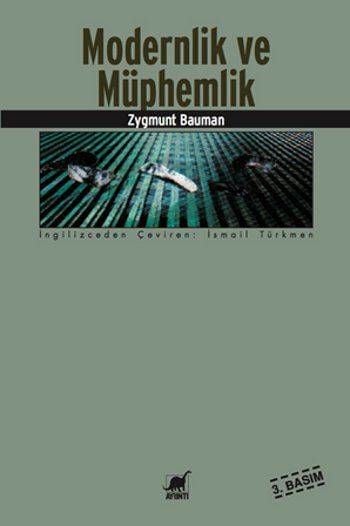
Modernity and Ambiguity
We present one of the most important books of Zygmunt Bauman, who is considered among the brightest sociologists of the century and who expanded the boundaries of sociology with his works: Modernity and Ambivalence.
According to Bauman, creativity is closely related to ambiguity; Ambiguity has always had an ambivalent relationship with modernity. On the one hand, the modern project wants to name, classify, organize things; One of its main enemies is the ambiguous positions that violate these boundaries, resist naming, and confuse; On the other hand, it produces the very ambiguity itself. Ambiguity, on the other hand, tries to survive by producing various strategies in the face of these "gardening" aspirations of the modern project; sometimes he becomes more royalist than king, a threat to the order without even realizing it while trying to be the most bland, like the Jews who try to be more German than German; It finds expression in a strange story by Kafka; It emerges in the theories and lives of Simmel and Freud... One end can lead to the Holocaust, the other end leads to the most creative, richest literature, ideas, and works produced by modernity... Ambiguity is both the bankruptcy and success of modernity. Bauman is also a part of the story he tells. He was a communist who fought against the fascist Germans in the ranks of the Red Army. After the war, he worked for many years as a loyal bureaucrat of the socialist utopia. However, before the modernist social projects began to go bankrupt, Bauman lost his faith in these projects and expressed his objection. He was therefore expelled from the army and the University of Warsaw; Then he emigrated from Poland and began working and writing in Western European academies. Traces of this life story inevitably appear in the thinker's works. From East to West; from military to civilian; The transition from the support of the modernist socialist society project to a thought-oriented life in Western academies are the parallel paths of the thinker's transition from intellectually modern to postmodern... There is also this: Bauman still describes himself as a socialist today. According to Bauman, postmodernity means "liberation from the typically modern drive to overcome ambiguity"; On the other hand, postmodernity is "modernity that deals with its own impossibility and is determined to live with it, for better or worse."
With his stimulating questions, Bauman activates our minds, the sensitive points of our moral stance, and our creative potentials.
Number of Pages: 400
Year of Printing: 2014
Language: Turkish
Publisher: Details Publications
Dough Type: 3rd Dough
Number of Printings: 3rd Edition
Size: 13x20
First Printing Year: 2009
Number of Pages: 400
Media Type: Paperback
Language Turkish
Original Name: Modernity and Ambivalence
| Publisher | : | Details Publications |
| Number of pages | : | 400 |
| Publication Year | : | 2014 |
| ISBN | : | 9789755393186 |
| Translator | : | Ismail Turkmen |
| The heart | : | Turkish |


